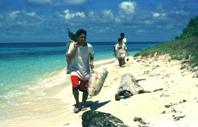Evaluation of the Man and the Biosphere (MAB) Programme
 May 2002 - The Man and the Biosphere programme was initiated at the 16th session of the General Conference of UNESCO as a follow-up to the 1968 Conference on the Rational Use and Conservation of the Resources of the Biosphere.
May 2002 - The Man and the Biosphere programme was initiated at the 16th session of the General Conference of UNESCO as a follow-up to the 1968 Conference on the Rational Use and Conservation of the Resources of the Biosphere.
The concept of Biosphere Reserves progressively came to constitute the central theme of the MAB programme, the focus of which was to conserve landscapes, ecosystems, species and genetic variation; to foster economic and human development which is socioculturally and ecologically sustainable; and to provide support for research, monitoring, education and information exchange related to local, national and global issues of conservation and development.
In 1995, a review of this particular dimension of MAB was undertaken and it resulted in the Seville Strategy for Biosphere Reserves and the Statutory Framework of the World Network of Biosphere Reserves.
In this context, the General Conference of UNESCO, at its 30th Session in October/November 1999, decided that an overall evaluation of the MAB Programme should be carried out, mainly capitalizing on the results of the review undertaken for the Seville + 5 meeting and on the conclusions of this meeting.
Download a copy of the evaluation report (pdf/ 257KB).
Download a summary of the report findings and recommendations as submitted to the 164th UNESCO Executive Board (pdf/ 65KB).
Image : © UNESCO/F. Bequette
|
|